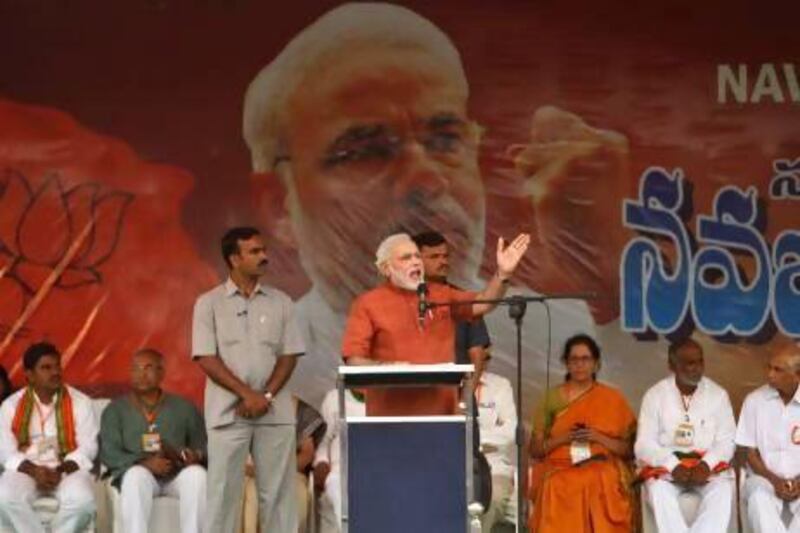NEW DELHI // Political parties are shifting their campaign trails onto the unfamiliar turf of social media in search of votes in upcoming elections.
From the Congress and the Bharatiya Janata Party (BJP) to the small, resource-strained Aam Aadmi Party, everyone is working on bolstering their digital presence ahead of five state polls this year and national elections next summer.
As Delhi, Rajasthan, Chhattisgarh, Mizoram and Madhya Pradesh hold elections, the Congress is adding a separate social-media wing to the communications teams in each of state.
Last week in Delhi, the Congress also held a social-media workshop, for five party officials from each state in the country. Two Congress ministers, Manish Tewari and Shashi Tharoor, held seminars at the workshop on Twitter and micro-blogging.
The BJP had already held a media workshop in Delhi the previous week, in which Narendra Modi - the chief minister of Gujarat and the party's presumptive prime ministerial candidate - spoke at length on reaching voters via social media.
Yet the pool of Indians who use social media is small in comparison with the number of eligible voters. While the electorate numbers 714 million, Facebook reports 82 million users in India and Twitter has roughly 20 million, according to comScore, independent Internet traffic analytics firm.
Prodyut Bora, who ran the online campaign for LK Advani, the party's prime ministerial candidate during the last election in 2009, said social-media efforts make a relatively slim difference in a country where "the right caste and social affiliations become the prime merit" of a candidate.
But he said parties would rather invest in social media than "take a chance on failure".
The BJP's strategy is being driven by Mr Modi, who has about 2.2 million Twitter followers - the most of any Indian politician. He also has an official Facebook page and a YouTube channel.
In a rare interview with the ANI news service this year, Mr Modi said that India's politicians had to make sure youth was engaged in the democratic process.
"Social media, in my opinion, is a tool that can help in this," he said.
One BJP official told The National about his work in building the party's social media footprint in Bihar. He travels to Bihar nearly every week, from his base in Mumbai, to strategise on how best to deliver the party's message through social media.
"This is all Modi's doing," he said. "He's very emphatic that the party needs social media if it needs to win the general election."
The official said in rural areas traditional advertising - in newspapers or on billboards - was rarely effective. "But if they're accessing the internet through even a simple mobile phone, then we have a good chance of reaching them," he said.
Although only a small percentage of the Indian electorate uses social media, a comScore report shows that the numbers of internet users are increasing.
India has the third highest number of internet users, after China and the United States. The growth has been sharp. Nearly 74 million Indians are now online from computers, up 31 per cent from March 2012.
If the number of people accessing the internet from mobile phones is added, the number rises to 164.81 million, according to the Telecom Regulatory Authority of India.
The comScore study also says Indians spend a quarter of their free time using social media.
"We read about how communication happened during the protests in Cairo in 2011," Arvind Kejriwal, the head of the Aam Aadmi Party, said. "We saw how useful social media could be in mobilising people."
Some analysts caution that predictions about the impact of social media have been called overblown.
A study released this year, by the Mumbai-based Iris Knowledge Foundation, identified 160 parliamentary constituencies in which the number of Facebook users either forms 10 per cent of the electorate or exceeds the win margin in the last election.
While admitting that its analysis was "simple to the point of being simplistic", the authors of the study said Facebook provided a new way to reach a significant numbers of voters in a constituency.
Analysing the study, however, Sadanand Dhume, a fellow at the American Enterprise Institute, wrote for the Wall Street Journal that "in a country where voting often breaks down by caste or religion, there's no evidence to suggest that any voter's primary identity is 'Facebook user' or 'Twitter follower.'"
[ ssubramanian@thenational.ae ]
twitter: For breaking news from the Gulf, the Middle East and around the globe follow The National World. Follow us





